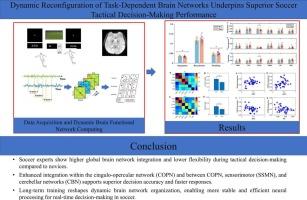任务依赖大脑网络的动态重构支撑了卓越的足球战术决策表现。
IF 2.6
4区 医学
Q3 NEUROSCIENCES
引用次数: 0
摘要
本研究通过研究任务活跃脑功能网络的动态重构,探讨了足球运动中卓越战术决策的神经机制。40名参与者根据足球专业分为两组,在进行功能性磁共振成像(fMRI)的同时执行战术决策任务。专业组由超过10 年高强度训练的运动员组成,而新手组只有最少的经验。利用多层网络分析,该研究检查了全球和模块化大脑网络的特性,包括集成、隔离和灵活性。结果显示,与新手相比,专业人士表现出更高的决策准确性、更强的全球整合能力和更低的网络灵活性。模块化分析表明,专家之间的眼-眼网络的集成度增强,灵活性降低。此外,足球专家表现出了更多的扣眼和感觉运动网络之间的整合,以及感觉运动和小脑网络之间的整合。这些发现表明,足球专长与优化的大脑网络动态有关,支持有效的认知处理和卓越的决策。这项研究为长期训练如何重塑大脑功能提供了有价值的见解,为体育专业知识提供了神经基础。本文章由计算机程序翻译,如有差异,请以英文原文为准。

Dynamic reconfiguration of task-dependent brain networks underpins superior soccer tactical decision-making performance
This study investigates the neural mechanisms underlying superior tactical decision-making in soccer by focusing on the dynamic reconfiguration of task-active brain functional networks. Forty participants, divided into two groups based on soccer expertise, performed a tactical decision-making task while undergoing functional magnetic resonance imaging (fMRI). The professional group comprised athletes with over 10 years of intensive training, while the novice group had minimal experience. Utilizing multilayer network analysis, the study examined global and modular brain network properties, including integration, segregation, and flexibility. The results revealed that professionals demonstrated higher decision accuracy, greater global integration, and reduced network flexibility compared to novices. Modular analysis indicated enhanced integration and decreased flexibility within the cingulo-opercular network among experts. Additionally, soccer experts exhibited increased integration between the cingulo-opercular and sensorimotor networks, as well as between the sensorimotor and cerebellar networks. These findings suggest that soccer expertise is associated with optimized brain network dynamics, supporting efficient cognitive processing and superior decision-making. This research provides valuable insights into how long-term training reshapes brain function, offering a neural basis for expertise in sports.
求助全文
通过发布文献求助,成功后即可免费获取论文全文。
去求助
来源期刊

Brain Research
医学-神经科学
CiteScore
5.90
自引率
3.40%
发文量
268
审稿时长
47 days
期刊介绍:
An international multidisciplinary journal devoted to fundamental research in the brain sciences.
Brain Research publishes papers reporting interdisciplinary investigations of nervous system structure and function that are of general interest to the international community of neuroscientists. As is evident from the journals name, its scope is broad, ranging from cellular and molecular studies through systems neuroscience, cognition and disease. Invited reviews are also published; suggestions for and inquiries about potential reviews are welcomed.
With the appearance of the final issue of the 2011 subscription, Vol. 67/1-2 (24 June 2011), Brain Research Reviews has ceased publication as a distinct journal separate from Brain Research. Review articles accepted for Brain Research are now published in that journal.
 求助内容:
求助内容: 应助结果提醒方式:
应助结果提醒方式:


